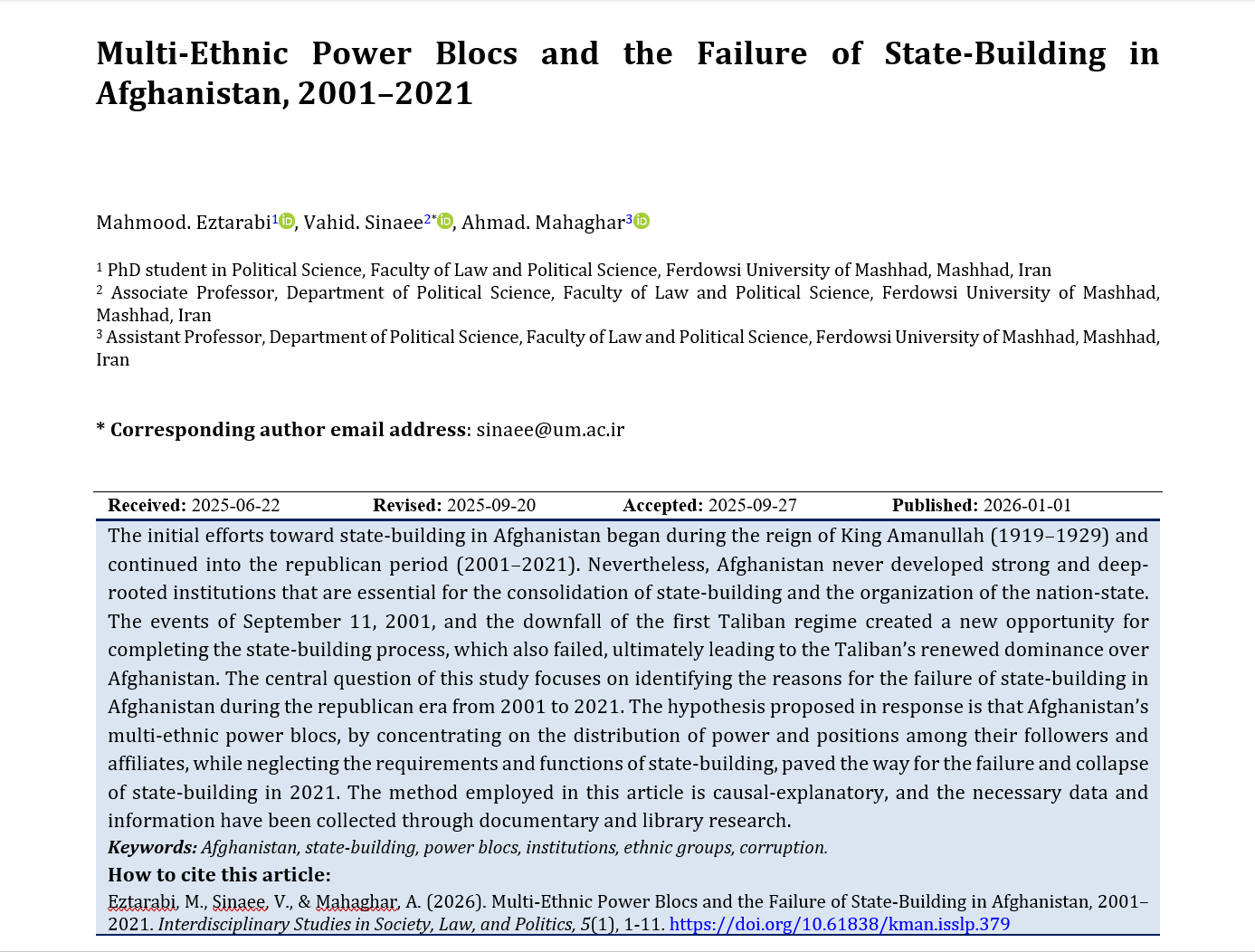Multi-ethnic power blocs and the failure of state-building in Afghanistan 2001-2021
Keywords:
Afghanistan, state building, power blocs, institutions, ethnic groups, corruptionAbstract
Initial efforts at state-building in Afghanistan began during the reign of King Amanullah (1919-1929) and continued until the republican era (2001-2021). However, Afghanistan did not have the solid and deep-rooted institutions that are necessary for consolidating state-building and organizing the nation-state. The events of September 11, 2001, and the fall of the first Taliban government, provided a new opportunity to complete the state-building process, which also failed, and the Taliban once again dominated Afghanistan. The main question of this research is focused on identifying the cause of the failure of state-building in Afghanistan during the years of the establishment of the republican system from 2001 to 2021. In response to this hypothesis, it is proposed that multi-ethnic power blocs in Afghanistan, by focusing on the division of power and positions among their followers and affiliates and ignoring the requirements of state-building and its specific tasks, caused the failure and collapse of state-building in 2021. The method of this research is causal-explanatory, and the required data and information were collected through documentary and library methods.
Downloads
References
Adel, M. (2009). Abdullah: I Will Not Participate in the Second Round of Elections.
Adeli, G. (2020). Has the Afghan Government Made Progress in Fighting Corruption?
Ahmadi, G. (2011). The Limping Process of Institution-Building in Afghanistan.
Anvari, R. (2006). Marshal Fahim Becomes Karzai's Senior Security Advisor.
Atraffi, E. (2015). Institution-Building and Principlism in the National Unity Government.
BBC. (2020). How Ghani's and Abdullah's Votes Changed in Which Provinces in the Final Afghanistan Election Results.
Burnell, P., & Randall, V. (2013). Issues in Third World Politics. Ghumes Publications.
Daryaei, Z., & Pazhwak, K. (2017). The Government of Families.
Dobbins, J. (2012). Nation-Building in Afghanistan After the Taliban. Peace and Development Studies Center.
Eriksen, S., & sundstol. (2017). State Effects and the Effects of State Building. Third World Quarterly, 38(4). https://doi.org/10.1080/01436597.2016.1176854
Farzanepour, H. (2017). Historical Application of Elite Theory and a Pathology of the Role of Agents on the Fragility of Afghan States. Islamic Political Research, 7(1).
Fukuyama, F. (2004). The Imperative of State-Building. Journal of Democraci, 2, 15. https://doi.org/10.1353/jod.2004.0026
Fukuyama, F. (2017). Political Order and Political Decay. Rozaneh Publications.
Gurr, T. R. (2000). Popele Vrsus State: Minaritiers at Risk in the New Centtury. United State Institut of Press.
Hadian, H. (2009). Structural Weakness of Nation-State Building in Afghanistan. Rahbord Quarterly, 18(51).
Hopkirk, P. (1990). The Great Game. Niloofar Publications.
Hosseini, A. (2020). The End of Electoral Disputes, Not Politics.
Huntington, S. (1997). Political Order in Changing Societies. Elm Publications.
Jahangir, K. (2014). The State in Afghanistan in a Structural Realist Approach. Political Quarterly, Faculty of Law and Political Science, 44(3).
Johnson. Thomas, H. (2006). The prospects for Post-Conflict Afghanistan: A call of the Sirens to the country's Troubled Past.
Kakar, M. H. (1986). The Two Periods of the Anglo-Afghan War.
MigdAl, J. S. (1988). Strong Societies and Weak States, State- Societ Relationship and State Capabilities in the Third World. Princeton university press. https://doi.org/10.1515/9780691212852
Mortazavi, S. H., & Ghiam, M. H. (2011). After the Bonn Agreement, A Look at What Has Happened.
Mottaqi, M. E. (2023). Effective Institutional Factors on State Formation and Performance in Afghanistan 2001-2014. 53(2), 369-398.
Mousavi, S. A. (2009). An Analytical History of Afghanistan from Zahir Shah to Karzai. Balkh Press.
Najafizadeh, H. (2016). The Ethnic Game and Political Discord in Afghanistan.
Osmani, A. A. (2019). Governance in Small Dimensions (A Study of Governance and Development Problems in the National Unity Government). Ahrari Publications.
Rashid, A. (1999). Pakistan and the Taliban: Afghanistan and Global Politics. Taraneh Publications.
Rosenborg, M., & Soukhanyar, j. (2014). Early tallies indicating Afghan vote a Success.
Sharan, T. (2016). The Network State: The Relationship Between Power and Wealth in Afghanistan After 2001. Vazheh Publishing.
Sinaei, V., & Khatibi, A. E. (2024). The Role of Afghan Tradition in the Failure of Leftist Modernization in Afghanistan. Central Eurasian Studies, 17(1), 213-237.
Smith, B. C. (2005). Understanding Third World Politics. Ministry of Foreign Affairs Printing and Publications Center. https://doi.org/10.1353/wp.2006.0004
Tamanna, F., & Sariolghalam, M. (2008). US Foreign Policy in Afghanistan: The Greater Middle East Project, Nation-State Building, and the Fight Against Terrorism. Strategic Studies Research Institute.
Tanin, Z. (2005). Afghanistan in the 20th Century. Irfan Publications.
Tolo News. (2016). Ashraf Ghani Responds to Abdullah Abdullah's Criticisms with a Sharp Tone.
Vaezi, H. (2010). Disturbed Identities. Badakhshan Publications.
Vafaeizadeh, M. Q. (2014). Ethnic Politics and Peace-Building in Afghanistan (The Foundations of Political Conflict and the Difficulties of Democratic Transition). Human Rights and Violence Eradication Institute.

Downloads
Additional Files
Published
Submitted
Revised
Accepted
Issue
Section
License
Copyright (c) 2025 Mahmood Eztarabi (Author); Vahid Sinaee (Corresponding author); Ahmad Mahaghar (Author)

This work is licensed under a Creative Commons Attribution-NonCommercial 4.0 International License.





